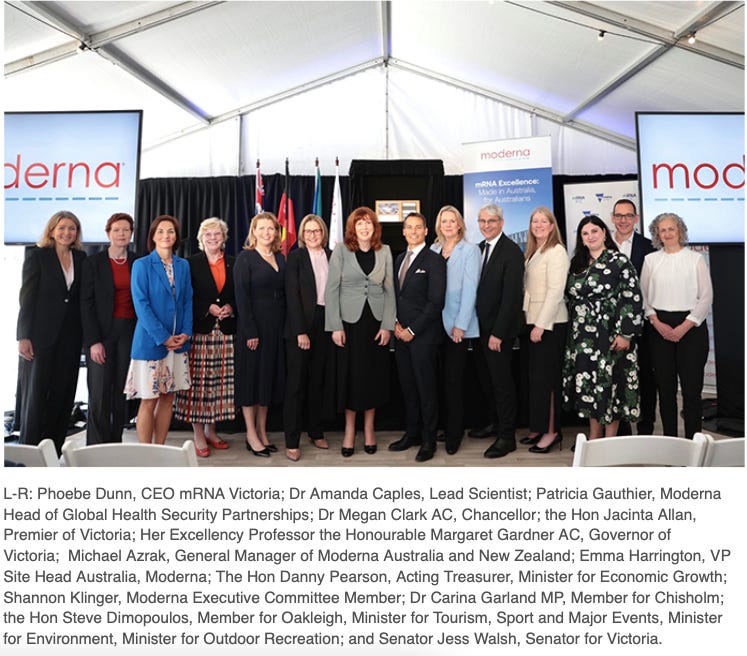In September 2024, Moderna announced that the clinical trial of its mRNA vaccine for respiratory syncytial virus (RSV) in children aged 5–24 months was abruptly halted.
The clinical trial, conducted in the UK and other countries, ended after alarming data suggested that the vaccine might not just fail to prevent severe RSV disease, but could potentially worsen it.
Until now, the data was kept secret.
This week, the Food and Drug Administration (FDA) disclosed that vaccinated children in the trial experienced higher rates of severe RSV compared to those in the placebo group.
The data was striking: 12.5% of vaccinated children developed severe or very severe RSV disease, compared to just 5% in the placebo group.
Moreover, among those who developed symptomatic RSV, 26.3% of vaccinated participants progressed to severe illness, sharply contrasting with the 8.3% in the placebo group.
The FDA, which granted the vaccine Fast Track designation in 2021, said the data has “uncertain implications for the ongoing and future pediatric development of other non-live attenuated RSV vaccines.”
Uncertain implications
The implications of this data are grave, drawing uncomfortable comparisons to the failed RSV vaccine trials of the 1960s.
Those earlier trials were halted after two infants tragically died of RSV disease following administration of a formalin-inactivated RSV vaccine.
This disaster led to the discovery of Vaccine-Associated Enhanced Respiratory Disease (VAERD), a condition where vaccination paradoxically exacerbates the severity of a viral infection, instead of preventing it.
Compounding the concern, similar mRNA RSV vaccines are being trialled in pregnant women, aiming to transfer protective antibodies to their babies.
This has raised alarms among doctors who’ve been following the development of RSV vaccines closely.
Peter Selley, a retired GP said, “The worry is that this, and other RSV vaccines given to pregnant women, might produce the same antibodies in the babies that cause this enhanced disease.”
Selley emphasised the need for rigorous oversight in light of past failures.
Speed of innovation
This latest trial data also reignites concerns over the FDA’s expedited pathways.
Fast Track designation, intended to accelerate the approval of treatments addressing urgent medical needs, has a lower burden of proof for safety and has many concerned that it compromises safety in favour of speed.
In the wake of this week’s news, questions are now being raised about whether early warning signs of safety risks were overlooked in the rush to bring the vaccine to market.
Governments have invested heavily in the success of Moderna’s mRNA vaccines.
In 2021, the Australian Federal government signed a $2 billion agreement, committing to the purchase of Moderna’s locally produced vaccines for at least a decade.
These vaccines, including RSV and influenza, are exempt from evaluation by the Pharmaceutical Benefits Advisory Committee, which typically ensures vaccines are safe and effective before being listed on the National Immunisation Program.
The exemption from evaluation has raised red flags, particularly as public trust in vaccine programs and mRNA technology wavers. Peter Collignon, an infectious diseases expert at the Australian National University, called the bypass “problematic.”
But, the Australian government has defended the deal as a strategic investment in “sovereign capability,” aimed at preparing for future pandemics. The facility, based at Monash University, Victoria, opened last week.

What now?
The FDA has responded to the latest data by convening a meeting of its Advisory Committee (VRBPAC), scheduled for December 12, 2024, to examine the implications of RSV vaccines in vulnerable groups, including infants and pregnant women.
For parents, the idea that a vaccine could worsen the disease it is meant to prevent, is profoundly unsettling. For scientists, it calls into question the long-term reliability of mRNA as a platform for combating diverse diseases.
The stakes are high—not only for the future of RSV vaccines but for the reputation of mRNA technology as a whole.
The FDA meeting can be watched here:



